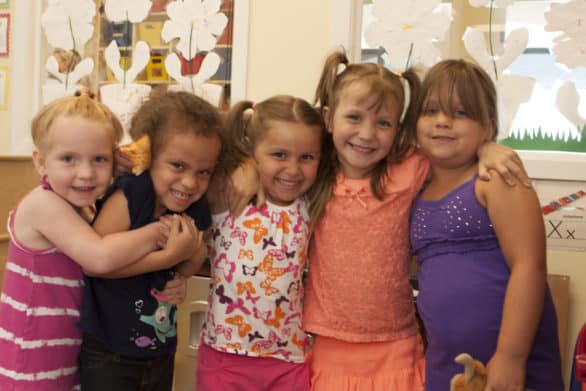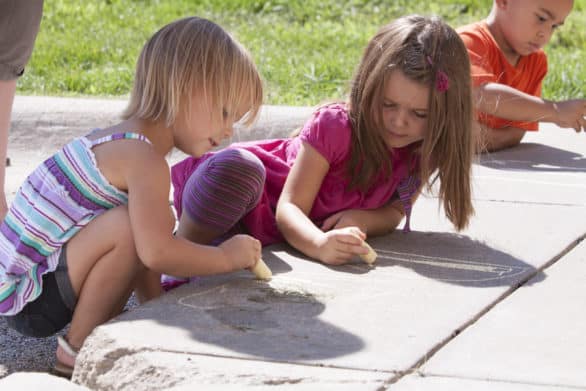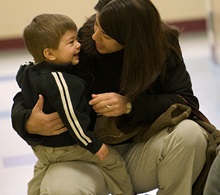Open-ended and independent play is one of the things that can build all the skills and tools necessary for kids to grow into successful and sufficient adults.
Posts

Originally posted on Oh My OMAHA
The days of searching for daycare in Omaha are fresh in my mind. Walking in wide-eyed to each place, not knowing what things I should be looking for, what signs to note for a “good center” and a “bad center.” I asked for recommendations, but ultimately, I just went with my gut. And how a center makes you feel is important, but there are some universal things you should consider beyond the happy vibe a place gives off. I talked with Jewel McKercher, a director at Premier Academy Child Enrichment Center in Omaha and Elkhorn, to help me fine-tune this list.
Before you start looking for childcare
Congrats! You’re having a baby! Or you’ve had your baby. Either way, I bet you’re exhausted and, maybe, overwhelmed. Well, hopefully I can help with this task you have in front of you: Finding the right childcare center.
Step 1 – Start early.
I was barely showing when we started touring different centers in downtown and Midtown Omaha. For my search, I asked friends and co-workers and family and anyone who looked pretty trustworthy. I didn’t realize there were more resources like local experts you can talk to, as well. McKercher suggested you contact Child Care Resource and Referral Agency to get started. They’ll give you facts and a list of childcare options that may meet your needs.
Step 2 – What are your needs?
Ah, see in Step 1, I said you’d contact the referral agency to get started, but you’ll have to have an idea of what your needs are. For me, location was important, as well as flexibility with cloth diapers, for instance. What are your needs?
Step 3 – Make calls.
Once you have a list of places that may fit your needs, it’s time to lineup a tour. Call each place to schedule an appointment.

Things to look for in an Omaha childcare center
The center as a whole
Check if the center is licensed or regulated. “Licensure ensures that the center is registered and has met or exceeded the state’s local requirements,” said McKercher. She also said it’s advisable to contact the state to see if the center has any complaints filed against it.
The employees
You want to know who works there, because these are the people who will spend the most time with your child. McKercher said the State of Nebraska requires the following background checks, at minimum: Department of Health and Human Services Central Registry Check; Nebraska State Sex Offender Registry; and Nebraska State Patrol Criminal History.
Also ask about any special training employees are required to have. “It is important for providers to have the following training: Pediatric CPR, Pediatric First Aid, Child Abuse prevention; Safe With You training, which is required by the State of Nebraska; and Continuing Education in the field of Early Childhood Education,” said McKercher.
Also ask about any special training employees are required to have. “It is important for providers to have the following training: Pediatric CPR, Pediatric First Aid, Child Abuse prevention; Safe With You training, which is required by the State of Nebraska; and Continuing Education in the field of Early Childhood Education,” said McKercher.
Also be aware of the employee turnover rate. “Consistency is extremely important to children and the environment in which they learn best,” said McKercher. “Getting used to new teachers takes time and energy that could be spent learning.”
Communication
I can’t tell you how delighted I was to get updates at the end of the day from my kids’ teachers. Back in my day (not too long ago), it was all paper and an occasional emailed picture. At places like Premier Academy, teachers have tablets that make it easy to send updates to parents, like photos or a video of a fun activity.
So, check how the center’s teachers communicate with parents. McKercher said parents should get a daily report of their child’s day. It should highlight what they ate and drank, lessons or curriculum, and if the child is younger, how many diaper changes.
How’s the classroom?
Most parents eyeball the teacher to student ratio in things like swim lessons, but it’s also a very important thing to keep low in childcare, too.
When you’re touring a childcare center, look into what the teacher to child ratio. “The fewer children the better for your child,” said McKercher. “You want your child to get plenty of attention and care.” McKercher said babies need a teacher to child ratio of 1:4, while 4-year-olds can do well with a ratio of 1:12.

The curriculum
And while you’re in the classroom, ask about the curriculum. Yeah, we’re talking about toddlers, but there are sound practices on how youngsters learn best and develop essential skills. McKercher suggested you ask if the center incorporates the Nebraska Early Learning Guidelines into the curriculum.
On top of that, ask what the Kindergarten Readiness rate is, and how prepared or advanced the students are when beginning Kindergarten. I’ll be honest, I didn’t even think to ask that when I was looking!
Meals at the daycare
Find out how the food is prepared and how healthy it is. McKercher said you can ask for the menu. Also ask if kids are encouraged to try different fruits and vegetables.
One of my kids had trouble with dairy early on, so when I was looking for a center, I wanted to be sure I could bring non-dairy drinks for him (most should be fine with this).
The outdoor space
When you look at that outdoor space, note if it’s fenced-in and if the equipment looks safe. McKercher suggested asking if the caregivers can see the entire playground and all the children playing. You should also ask how often they go outside.
My final thoughts on what to look for
I hope this list gives you plenty of ideas for things to look for and questions to ask when you’re looking at a daycare center. It’s an important decision that may be easy to make or may take some time researching. Good luck!

Schedule a Tour at Premier Acedemy Today!

If you are returning to work after maternity leave, chances are you have done your research on what to expect. The fact is, however, no matter how well prepared a mother is to return to the office, she is likely in for some unexpected surprises.
In its article, 8 Secrets No One Tells You About Returning to Work After Maternity Leave, the Reader’s Digest highlights some of the more surprising things that new moms encounter upon their return to the workplace. Here are a few of those (pleasant and not so pleasant) surprises:
- You will begin to connect with your old self
- You don’t have to lose all your baby weight
- You will likely cry some
- You need to learn to delegate
- You need to concentrate on work while at work
The fact is, until you experience for yourself what going back to work following maternity leave is like, you can never be 100 percent prepared. So whether you think it is going to be extremely stressful or no big deal, you are likely to have a few surprises in store!
Premier Academy offers affordable childcare in the Omaha/Elkhorn area.
To learn more, visit us at premieracademyinc.com
 Why do mornings seem so difficult? For parents, especially working parents that use child care in Omaha Nebraska, there is typically so much to do in a short period of time. We here at Premier Academy agree. “Morning is the time in which temperamental differences may be most evident – the child who is slow to get going clashes with the mother or father who is fast paced. Or the child who is crabby clashes with the parent who is also crabby,” say authors Ellen Galinsky and Judy David in their book The Preschool Years: Family Strategies That Work – from Experts and Parents. Mornings also provide the perfect opportunity for children to assert their individuality. With the clock ticking for work and meetings, this is prime time for power struggles.
Why do mornings seem so difficult? For parents, especially working parents that use child care in Omaha Nebraska, there is typically so much to do in a short period of time. We here at Premier Academy agree. “Morning is the time in which temperamental differences may be most evident – the child who is slow to get going clashes with the mother or father who is fast paced. Or the child who is crabby clashes with the parent who is also crabby,” say authors Ellen Galinsky and Judy David in their book The Preschool Years: Family Strategies That Work – from Experts and Parents. Mornings also provide the perfect opportunity for children to assert their individuality. With the clock ticking for work and meetings, this is prime time for power struggles.
Whether your children are going back to school or struggling with a new morning routine, getting ready for school or daycare doesn’t have to be a struggle. The Canadian Child Care Federation offers these tips for discovering how to get ready for school in a way that works for your family.
Tips for a Smooth Morning Routine for School or Daycare
Leave room for unhurried moments. Make sure everybody has enough sleep and rises early enough to avoid rushing. Give yourselves time for some unhurried moments together before you have to leave the house.
Complete chores the night before. To make the morning routine less stressful, do things the night before. After dinner, for example, prepare lunch boxes and leave them in the fridge overnight. And after you clear away the dinner things, set the breakfast table for the next morning. Ask family members to bath/shower/wash hair the night before, if possible. Gather permission forms, lunch money, or notebooks. Encourage your children to help with chores that are suitable for them.
Offer encouragement. If a small child is prone to dawdling, you may have to offer frequent gentle reminders. When you are busy in the kitchen and the child’s room is on another level, have her dress nearby where you can supervise while you work.
Give yourself more time. Add 10 or 15 extra minutes to your usual schedule. If the child is ready on time, spend it reading, talking, or doing some other activity together, making sure you give him your undivided attention during this period.
Set reasonable expectations. Expect your children to do what they are capable of, for example washing and dressing themselves if they are old enough. This may be an unreasonable expectation for a younger child. Set one task at a time to make expectations seem more attainable.
Have a family meeting. When children are old enough to join in a family discussion, sit down together, perhaps the night before, to go over your morning routine and discuss the best morning routine for the entire family.
Get out the door. If a child has not been cooperative, use the extra 10-15 minutes to get him ready with as little fuss as possible. Do not scold or chat; just do what is necessary to leave on time.
Spend time together. Promise and follow through to spend time together after you pick your child up from child care if the morning routine goes smoothly. Don’t forget to recognize your children’s good effort using encouragement on days when everything works well and your family starts the day on time!
Dealing with Resistance to a Daycare or School Morning Routine
Children may resist morning routines by arguing about breakfast food, debating about what clothes to wear, or playing when they should be getting ready to leave. Children often seek our attention in the morning, especially when we are rushing.
Our children soon learn that when they resist, argue, or stall, they get our attention. These morning difficulties may arise even when we give our children plenty of attention at other times. What can you do to spur on the uncooperative child and give him a sense of power and control?
Encourage and remind, but try not to nag. Let them experience the consequences of procrastinating. This may mean missing breakfast or forgetting their homework.
Establish an agreement that the TV doesn’t go on in the morning until the chores are done, if at all.
Create a morning routine chart with your child, and involve your child by asking, “What’s next on the routine chart?” They can help cut out pictures and design the chart. Have stickers for your child to place on the steps she completes.
Use an alarm clock in children’s rooms. This will ensure that you wake them up at the same time each morning and you haven’t gotten lost looking over your emails. This will help prepare toddlers for elementary school as well.
Ask children whether they would like your help getting ready for school.
Avoid lectures. Instead, asking “what” and “how” questions – such as “what happens when you don’t get dressed in the morning?” and “How do you feel about missing the school bus?” – will entice conversation with our children. These questions help children think for themselves, whereas our lectures may make them stop listening.
Talk about times when you have procrastinated, what happened as a result, and how you felt about it. These conversations can be used as teachable moments for your kids.
Plan ahead, and give your child enough time to succeed on his own. Remember to give reminders and establish clear expectations regarding his morning routine.
Let your child know that you need her help and say, “I would appreciate you getting dressed so we can get to school before circle time.” This invites cooperation instead of defiance.
Many of us charge off with our to-do lists in hand, thinking that when everything is done (which it never is) we can enjoy life. But what we do every day is life. Our ability to step in time with our children amid the everyday stuff, such as getting out of the house in the morning, takes some organization and a lot of patience. Using these tips for establishing a morning routine can help you get it done.
Schedule a Tour at Premiere Academy Today
Operating Hours
Monday-Friday
Omaha: 6:30 A.M. – 6:00 P.M.
Elkhorn: 6:30 A.M. – 6:30 P.M.
Premier Academy Elkhorn
20111 Roberts St.
Elkhorn, NE 68022
Phone (402) 289-2239
Enrollment Specialist: director@premieracademyinc.com
Premier Academy Omaha
3525 N. 147th St.
Omaha, NE 68116
(SW Corner of 144th & West Maple rd.)
Phone: (402) 493-8812
Enrollment Specialist: veronica@premieracademyinc.com
